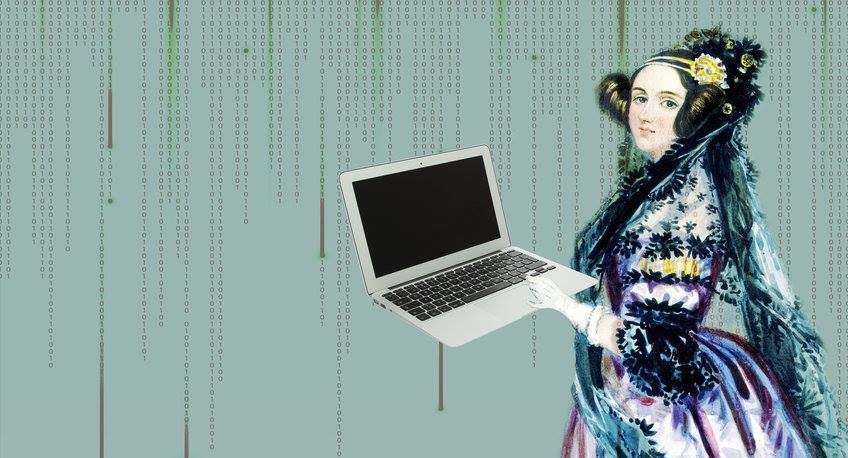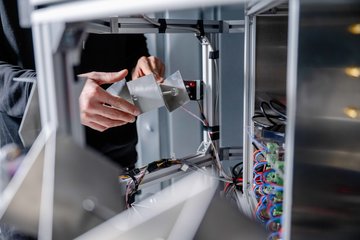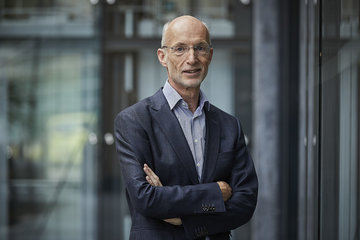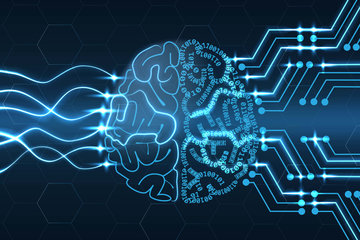
Ada Lovelace and the first computer programme in the world
Mathematician Anna Siffert from the Max Planck Institute for Mathematics on why Ada Lovelace is considered the world's first computer programmer
Augusta Ada Byron is born 10th December 1815, as the daughter of Anne Isabella Noel-Byron (known as Annabella) and famous English poet Lord Byron. Shortly after her birth, her parents' marriage is already over. Out of fear that Ada might inherit the stormy and unpredictable temper of her poet father, the mathematically talented Annabella, once called 'the princess of parallelograms' by Byron, makes sure that her daughter receives a scientific education.

12-year-old Ada, who is especially interested in mechanics, wants to invent a flying machine - unfortunately, with no success. But the love for machines is the foundation of Ada Lovelace's later friendship with mathematician Charles Babbage, whom she meets at a reception when she is 17. Babbage is working on a prototype of a calculating machine called "The Difference Engine", and Ada is intrigued by his ideas. Ada and Babbage strike up a correspondence over mathematical ideas that lasts for many years.
In 1848, Ada translates a French article about his second project, the "Analytical Engine", into English. She also provides her own comments on the text. Her annotations, simply called "notes", turn out to be three times as long as the actual transcript. They show that Ada recognizes the machine's potential beyond a device for numerical calculations. Since the functions of the Analytical Engine are not defined, they can also be applied to other things than numbers. The Analytical Engine, Ada writes 'holds a position wholly its own'. Her vision of a machine that could also process musical notes, letters and images, anticipates modern computers by a hundred years. In her now famous note "G", Lovelace also adds a step-by-step description for computation of Bernoulli numbers with Babbage's machine - basically an algorithm - which, in effect, make her the world's first computer programmer.
Ms Siffert, what fascinates you about Ada Lovelace? Are there any aspects of her life and work that you strike you as particularly remarkable?
Her scientific work, which is outstanding – regardless of the person behind it.
About a century before Konrad Zuse designed the first programmable computing machine, in the 1840s, Ada Lovelace wrote the first computer programme in the world. From a modern perspective, her work is visionary.
In her lifetime, her scientific contributions hardly attracted any attention. It wasn't until the 20th century, with the beginning of the computer age, that the significance of her notes was recognized. Today she is world famous, not least because in the 1970s, the computer language ADA was named after her. For her achievements, she is rightly called a pioneer of modern computer science.
I am also fascinated by the courage Ada Lovelace showed in order to realize her dream of a scientific career when facing great societal resistance. This is true of course for all women scientists of the time, and makes their work even more impressive in hindsight. Apart from her scientific career, Ada also raised three children.
What were the prevailing gender roles during Ada Lovelace's time? How did she manage to persevere and be successful despite the many restrictions on women at the time?
Nineteenth century society was patriarchal: women were relegated to the roles of mere observers. They were not considered as independent or as mature. The man was the head of the family. The ideals of the time saw marital duties – the duties of a wife and mother - as the sole purpose of a woman's life. The exceptions were famers, where usually everyone in the family pitched in with the work needed.
Women were brought up with a view to becoming wives and mothers. Women in Great Britain, for example, were denied access to universities and scientific libraries. Apart from such restrictions, women had to contend with considerable prejudices. 'Scientific' reasons were cites as to why women were not qualified to study. The Suffragettes women's movement didn't originate in Great Britain until the beginning of the 20th century, well over 50 years after Ada Lovelace's death in 1852.
How did she manage to persevere and be successful despite the many restrictions on women at the time?
First of all, Ada Lovelace was born into a wealthy family. Her father, Lord Byron, was one of the greatest poets of the time. However, he left the family shortly after Ada's birth, so she grew up with her mathematically-minded mother.
Ada's mother ensured that she was given an education with the best tutors. The famous logician Augustus De Morgan with whom Ada took classes, had a decisive influence on Ada Lovelace's later main work, the "Notes". She also met the mathematician Charles Babbage, an inventor of computational machines. In 1842, he gave a lecture on his latest invention, the Analytical Engine. The Italian mathematician Luigi Menabrea wrote a report of this talk in French. Ada Lovelace translated this article into English with the help of Charles Babbage and supplemented it with her own comments. Her notes show that Ada saw the potentials for a computer in the Analytical Engine. Her fame is largely based on this work.
Ada also received support from her husband, William King. He copied articles for her in libraries because as a woman she was not allowed to go to libraries.
How important are Ada Lovelace contributions to computer science today?
If Ada had not written the first computer programme, someone else would have done it. The significance of her work lies in the fact that she was the first to do so - a century before the invention of the computer. Nowadays, of course, her program does not have any practical applications.
Obviously, much has improved for women in science since the 18th Century. In your view and your experience, what do you regard as changes that have happened in terms of women in science?
The role of women is by no means so rigidly defined as in the nineteenth century. On paper at least, women have the same rights as men. However, there are still inequalities, for example with regard to pay. Compared to male colleagues, women often receive significantly less money for their work.
Nevertheless, despite many positive changes, the number of women in STEM disciplines is still lower than the number of men in these fields. What do see as contributing factors to this discrepancy? (For example, continuing cultural bias, gender stereotyping, 'math and science are not for women'; lack of female role models etc.)
In my opinion, gender stereotypes and / or cultural bias play only a marginal role in Germany. I also feel there are quite a few role models available. I think one factor for the discrepancy is the incompatibility of combining a family with a scientific career, although in recent years and decades a lot of programmes have been created to improve this situation.
What do you think is necessary in order for more girls to get involved in STEM disciplines, so that more women will pick up and remain in STEM professions?
Employers must ensure the compatibility of scientific careers with the founding of a Family. Also, working conditions for scientists are often not as good as those for jobs in industry. Especially for women scientists with a family, offers for childcare are indispensable. It would also be desirable to make temporary employment contracts permanent at a much earlier stage, and to create more jobs. This would provide planning certainty, which would make a scientific career much more attractive.
Do you consider mentor programs useful?
Basically, I think they are very useful. But in my opinion they should be offered to both women and men. I see it as quite problematic that men are excluded from certain funding programs because of their gender.
What role models do you see for women in science?
Everyone can choose their own role model. Today, there are certainly many successful female scientists in every discipline who could serve as models.
What advice would you give young women considering science as a career path?
That they should certainly try and go for it!












